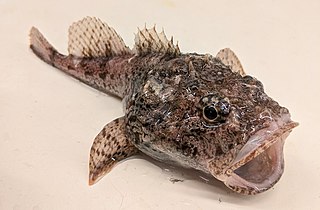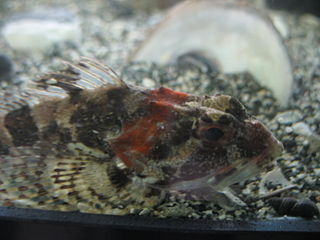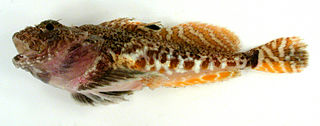
Myoxocephalus is a genus of marine ray-finned fishes belonging to the family Cottidae, the typical sculpins. They are found in the northern Pacific, Arctic and Atlantic Oceans, with a few species in lakes.

The Norway bullhead is a species of marine ray-finned fish belonging to the family Cottidae, the typical sculpins. This species is found in the northeastern Atlantic Ocean.

Enophrys is a genus of marine ray-finned fishes belonging to the family Cottidae, the typical sculpins. These fishes are found in the northern and eastern Pacific Ocean.

Gymnocanthus is a genus of marine ray-finned fishes belonging to the family Cottidae, the typical sculpins. These fishes are found in the northern Pacific, Arctic and northern Atlantic Oceans.
The lavender sculpin is a species of marine ray-finned fish belonging to the family Cottidae, the typical sculpins. It is found in the eastern Pacific Ocean.

The belligerent sculpin, or flathead sculpin, is a species of marine ray-finned fish belonging to the family Cottidae, the typical sculpins. This species occurs in the northern Pacific Ocean.

Megalocottus is a small genus of marine ray-finned fishes belonging to the family Cottidae, the typical sculpins. These fishes are found in the western Pacific Ocean.

Microcottus is a small genus of marine ray-finned fishes belonging to the family Cottidae, the typical sculpins. These fishes are found in the northern Pacific Ocean.
Phasmatocottus is a monospecific genus of marine ray-finned fish belonging to the family Cottidae, the "typical" sculpins. The only species in the genus is Phasmatocottus ctenopterygius from the northwestern Pacific.
The hairhead sculpin is a species of marine ray-finned fish belonging to the family Cottidae, the typical sculpins. It is the only species in the monospecific genus Trichocottus.

The spinyhead sculpin is a species of marine ray-finned fish belonging to the family Psychrolutidae, the fatheads. This species is found in the northern Pacific Ocean. This species is the only species in the monospecific genus Dasycottus.

Blepsias cirrhosus, the silverspotted sculpin, is a species of sculpin belonging to the subfamily Hemitripterinae of the family Agonidae. This species is found the northern Pacific Ocean from the Sea of Japan and Alaska to San Miguel Island off southern California.

Blepsias bilobus, the crested sculpin, is a species of sculpin belonging to the subfamily Hemitripterinae of the family Agonidae. This species is found in the North Pacific Ocean.

Myoxocephalus aenaeus, commonly known as the grubby, or little sculpin, is a species of marine ray-finned fish belonging to the family Cottidae, the typical sculpins. This species is found in the northwestern Atlantic Ocean.

Myoxocephalus jaok, the plain sculpin, is a species of marine ray-finned fish belonging to the family Cottidae, the typical sculpins. This species is found in the northern Pacific Ocean and adjacent Arctic Ocean.

Myoxocephalus scorpioides, the Arctic sculpin or northern sculpin, is a species of marine ray-finned fish belonging to the family Cottidae, the typical sculpins. This fish is found in the Arctic Ocean.

The hamecon is a species of marine ray-finned fish belonging to the family Cottidae. This species is found along the coasts of northeastern Atlantic Ocean and in the Arctic Ocean.

Cottus cyclophthalmus is a species of freshwater ray-finned fish belonging to the family Cottidae, the typical sculpins. This species is found in northeastern Europe, in the Neman River and Venta River drainages in the basin of the Baltic Sea. This species is similar to the European bullhead but is distinguished by uts round, protruding and tubular eyes set close to the front of head; papillae in the skin on the top and sides of the head, a scale-less body without any bony prickles and a complete sensory canal on the flanks which has 32–36 pores. It is classified within the subgenus Cottus and the specific name cyclophthalmus is a compound of cyclos, meaning "round", and ophthalmus, which mean "eye", an allusion to the round, tubular eyes.

Enophrys diceraus, the antlered sculpin, is a species of marine ray-finned fish belonging to the family Cottidae, the typical sculpins. This species occurs in the northern Pacific Ocean.

The Arctic staghorn sculpin is a species of marine ray-finned fish belonging to the family Cottidae, the typical sculpins. This sculpin is found in the Arctic Ocean and the northern Atlantic Ocean.
















